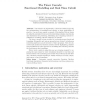Free Online Productivity Tools
i2Speak
i2Symbol
i2OCR
iTex2Img
iWeb2Print
iWeb2Shot
i2Type
iPdf2Split
iPdf2Merge
i2Bopomofo
i2Arabic
i2Style
i2Image
i2PDF
iLatex2Rtf
Sci2ools
127
click to vote
ICTAC
2005
Springer
2005
Springer
The Timer Cascade: Functional Modelling and Real Time Calculi
Case studies can significantly contribute towards improving the understanding of formalisms and thereby to their applicability in practice. One such case, namely a cascade of the familiar 24-hour timers (in suitably generalized form) provides interesting gedanken experiments and illustrations for presenting, illustrating and comparing various formalisms for modelling real-time behaviour of systems. The timer cascade is first modelled in a general-purpose functional formalism (Funmath) and various properties are derived, including an interesting algebraic monoid structure of timer programs. Then it is described and analyzed in duration calculus, thereby highlighting, similarities and differences in the approach to modelling and reasoning, and also the link between the formalisms. Future work consists in using this case as a running example for exploring the same issues for other formalisms intended for real time and hybrid systems. The underlying idea is that other authors join this ...
| Added | 27 Jun 2010 |
| Updated | 27 Jun 2010 |
| Type | Conference |
| Year | 2005 |
| Where | ICTAC |
| Authors | Raymond T. Boute, Andreas Schäfer |
Comments (0)

